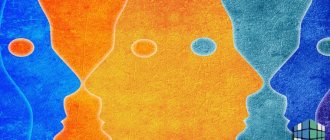History of the development of psychology as a science
Natalia Vysotskaya
History of the development of psychology as a science
ABSTRACT
Topic: “ History of the development of psychology as a science ”
Performed
Vysotskaya Natalya Nikolaevna.
Introduction
The formation of psychology as a science has a long period, but a fairly short history . Since Ancient Greece, attempts have been made to explain mental phenomena . The psyche and soul were considered as an indispensable attribute of nature: everything has a soul, and it, in turn, is the source of movement and development . The soul is a substance independent of the physical body, which influences a person’s destiny, his health, and success. This approach is called animism (from the Latin anima - soul, spirit)
.
Subsequently, ideas about the nature of the psyche were developed by Democritus and Plato . Democritus is the founder of materialistic views on psyche .
URL: https://www.physchem.chimfak.rsu.ru/Source/History/Persones/Demokritos.html
He believed that the soul consists of atoms. He gave an explanation for the phenomenon of causality and showed that there are no uncaused phenomena. Plato, on the contrary, spoke about the primacy of ideas and the secondary nature of the material world. He believed that any knowledge is a process of recollection of the soul. The philosophy of idealism originates from Plato. The great minds of antiquity assumed that there is a connection between the psyche and the brain . They believed that the psyche depends on the environment, and distinguished stable individual signs of the human psyche .
In the Middle Ages, under conditions of total dominance of religion, there was a ban on the study of man. And yet, starting from the 15th century, the development of psychological thought , and it was associated with the blossoming mechanics. Descartes was the first to apply the laws of mechanics to . He compared the work of the body with technical devices. He also believed that the animal is soulless, and its behavior is a reaction to external influences. Descartes introduced the concepts of reflex and consciousness, but “torn apart”
their.
Spinoza made an attempt to overcome Descartes' dualism. He wanted to create a doctrine about man as an integral being. He identified 3 main motives for human activity: attraction, joy, sadness. Based on these motives, various emotional states appear. Locke developed the ideas of sensory sources of knowledge of the world .
His doctrine is called sensationalism, because he argued that there is nothing in the mind that does not pass through the senses. In the 18th century French philosophers Diderot, Holbach, Helvetius, Condillac first put forward ideas about the social determination of the human psyche . These ideas formed the basis of some of the provisions of modern psychology .
At the beginning of the 19th century. New approaches to the psyche . There is a promise for the formation of psychology as a science . Among the prerequisites are the development of the anatomy and physiology of the nervous system. In the second half of the 19th century. knowledge from the fields of biology, physiology, and medicine became the basis for the creation of scientific psychology .
Chapter 1 The period of formation of psychological knowledge within the framework of other scientific disciplines (4th – 5th centuries BC – 60s of the 19th century)
From the perspective of scientific methodology, the history of psychology can be described as a sequence of stages in the formation of ideas about the subject, method and explanatory principles within the framework of scientific paradigms, in the sequence of their emergence, coexistence, competition and change at different stages of the formation of psychology as a single independent scientific discipline.
In the history of psychology there is a period when it was formed in the depths of other scientific disciplines, and a period when it became an independent scientific discipline.
The period of formation of psychology within the framework of other scientific disciplines is characterized by:
1. lack of independence of psychological knowledge . This knowledge was presented as one of the parts of philosophical and medical teachings. At first it was in the form of a doctrine of the soul, then - a philosophical theory of knowledge, doctrines of experience and consciousness;
2. lack of communities that would share common views on the subject and method of study;
3. speculative nature of the research. During this period, there was a complete absence of an experimental approach to research.
This period was preceded by the emergence and development of ideas about the soul within the framework of religious systems and rituals that ensured the unity and existence of primitive societies. Ideas about the soul provided explanations for such phenomena as sleep, dreams, trance states, the effects of prohibitions (taboos, mastery of magical skills, death, etc. A common feature of the primary views on mental phenomena was the invariable endowment of mystery and sacredness to them. Another important characteristic These views - animism - the belief that every object of not only living, but also inanimate nature certainly has a soul and, in addition, souls can exist independently of objects and are special beings.
1.1. The doctrine of the soul (5th century BC - early 17th century AD)
The doctrine of the soul has its basis in ancient Greek philosophy and medicine. Science in Ancient Greece arose due to two circumstances:
1. science is a special field of human activity. It was formed independently of religion and existed separately from it;
2. orderliness of the cosmos (all things)
was considered based not on the power of a super being, but on law. The Greeks highly revered the law, and even the supreme gods were subordinate to it.
New ideas about the soul were not religious and were not based on traditions. These ideas were entirely secular, open to all, and open to rational criticism. The purpose of constructing the doctrine of the soul was to identify the properties and laws of its existence, that is, the doctrine of the soul had a distinct nomothetic character.
Another event that influenced the development of the doctrine of the soul was the transition from spontaneous and irrational animism, according to which all events take place under the influence of the souls of natural objects, to hylozoism, a philosophical doctrine based on the idea of the inseparability of life from matter, of life as a universal property of matter. This doctrine introduced the starting point about the integrity of the observable world. Although this point of view, shared, in particular, by Descartes, leads to panpsychism (the idea of the animation of objects of both living and inanimate nature), hylozoism includes the soul within the scope of natural laws and makes its study accessible. These were the initial conditions for the formation of the doctrine of the soul and its initial provisions.The development of precisely these provisions for a long time determined the history of the formation of psychological knowledge .
The most important directions in the development of ideas about the soul are associated with the teachings of Plato (427 - 347 BC)
and
Aristotle (384 - 322 BC)
.
Plato divided the material mortal body and the immaterial immortal soul. Individual souls are imperfect images of the one universal world soul. Each soul has a portion of the universal spiritual experience which it recalls, and this is the essence of individual cognition. This doctrine laid the foundations of the philosophical theory of knowledge and determined the orientation of psychological knowledge towards solving philosophical, ethical, pedagogical and religious problems.
A fundamentally different idea of the soul was given by Aristotle in his psychological treatise “On the Soul”
. URL:
https://osense.narod.ru/library/philosophy/html/110102_aristot.htm
According to Aristotle , the soul is nothing more than the form of a living organic body. The soul provides purpose. It is the basis of all life manifestations and is inseparable from the body. This situation completely contradicts Plato’s teaching about the infusion of souls at birth and their expiration at death. But both philosophers agree that the soul determines the purpose of the activity of the living body. The concept of a goal, a final cause, was introduced by Aristotle to explain the determinism of the behavior of living organisms. This explanation was teleological, leading to the paradox of the influence of the future on the past, but it made it possible to introduce the activity of living organisms into the circle of explainable phenomena. Aristotle gave one of the earliest formulations of the explanatory principles of psychology - development , determinism, integrity, activity.
Disciple of Plato, follower of Aristotle Theophrastus (372 – 287 BC)
in the treatise
“Characters”
he gave a description of 30 different characters,
developing the Aristotelian idea of this property of a person. His work marked the beginning of a separate line in popular psychology , which was continued in the Renaissance by Montaigne, in the Enlightenment by La Bruyère, La Rochefoucauld, then by von Kniege, and in our time by Carnegie.
The successes achieved by ancient philosophers and physicians in the development of the doctrine of the soul served as the foundation for all further developments of psychological knowledge , which at this stage mainly boiled down to expanding the range of phenomena under consideration. In the 3rd – 4th centuries. n. e. in the works of Plotinus (205 – 270, Aurelius Augustine (354 – 430)
and early Christian philosophers and theologians, the inner world of man and the possibilities of self-knowledge are highlighted as the subject of research; for the first time, descriptions of the phenomena of consciousness appear, for example, its focus on the subject, highlighted by Thomas Aquinas
(1226 – 1274)
.
From 5th to 14th centuries. in the works of Boethius (480 – 524, Thomas Aquinas, Duns Scotus (1256 – 1308)
an idea of personality is formed. It is important to note that the powerful influence of Christian theology, the foundations of which included the philosophy of Neoplatonism, gave these works an ethical-theological character, bringing it closer to the line laid down by the teachings of Plato.
The pinnacle and completion of the stage of development of psychological knowledge within the framework of the doctrine of the soul was the system of views of Francis Bacon (1561 - 1626)
.
The study of the soul formed part of a unified science of man , the construction of which Bacon planned. The novelty of Bacon's approach consisted in the rejection of a speculative solution to questions about the nature of the soul and the transition to an empirical study of its characteristics. However, this intention could not be realized, because at that time ideas about neither the general scientific method nor the subject of research had yet been formed. Bacon, in accordance with tradition, separated the science of the body from the science of the soul , and in the doctrine of the soul he singled out the science of the rational divine soul and the irrational soul, feeling, bodily, common to humans and animals. Bacon’s teaching revived the idea of hylozoism: the living also have the ability to choose , and dead bodies (for example, a magnet)
. Important new components of the doctrine of the soul introduced by Bacon are the idea of the role of society and tools in the processes of cognition.
1.2. Philosophical theory of knowledge, doctrines of experience and consciousness (mid-17th century - mid-19th century)
Ideas about the soul changed radically after René Descartes (1596 – 1650)
introduced the concept of
“consciousness”
.
It was considered as a criterion distinguishing between soul and body. Introspection, according to Descartes, is so obvious that it was used by him to provide indisputable proof of the very existence of the subject, formulated in the form of the aphorism “I think, therefore I exist
.
According to the criterion of introspection, only man has a soul, and animals do not have a soul and act like mechanical devices. To explain actual bodily actions in animals and humans, Descartes introduced the idea of a reflex, in which the principle of mechanistic determinism was implemented. The essence of the reflex, according to Descartes, is that external influences through the movement of animal spirits along the nerves lead to the movement of certain muscles, which represents the action of the body. Descartes' teaching formed the basis of new psychological knowledge , since it introduced the ideas of:
- the accessibility of the inner world through introspection;
— about the reflex as a mechanism of behavior;
- about the leading role of the external world in the determination of behavior, as well as its mechanistic interpretation;
— about the psychophysical problem and its dualistic solution.
These innovations for a long time determined the course of development of the philosophical doctrine of cognition, and then served as an important factor in the formation and development of scientific paradigms in psychology .
By the middle of the 17th century. experience was accepted as the subject of the philosophical theory of knowledge. The concept of experience included ideas, sensations, feelings and the results of introspection. At this time, the idea developed and began to dominate that knowledge is based on experience, and we go, which constitute the content of consciousness, appear on the basis of experience. This point of view goes back to sensationalism, a doctrine that developed in antiquity, according to which there is nothing in the mind that was not previously in the feeling. It was the most important role of the idea of experience that determined the name of an entire direction of research within the philosophy of knowledge - empirical psychology . This term, introduced by Christian Wolf (1679 - 1754), emphasized the task of studying specific phenomena of mental life using introspection, in contrast to rational psychology , which dealt with the eternal, unchanging, immortal soul. The doctrine of consciousness was formed within the framework of philosophy, and even using the results natural scientific works, it did not have an experimental character in the modern sense of the word.
The basis of the study of consciousness as in the predecessors of Wolff - Hobbes (1588 – 1679)
and Locke (1632 - 1704, and among the thinkers who
developed this teaching until the second half of the 19th century - Condillac (1715 - 1780, Herbart (1776 - 1841, Lotze (1817 - 1881), there was precisely the method of introspection, they were united by the idea of a special the essence of the phenomena being studied, comprehended exclusively by introspection. Both external and internal experience are accessible only to introspection.
Leibniz (1646 - 1716)
introduced, in addition to the concept of
“perception,”
the term
“apperception
,” interpreting it as
a mental force that determines the purposefulness of actions, their active, conscious, voluntary nature.
Thus, if the Cartesian and Lockean ideas about consciousness exhausted the entire phenomenology of states of mind, then Leibniz was the first to identify a circle of unconscious phenomena inaccessible to introspection. , associative and empirical psychology acted as branches of the philosophical theory of knowledge and therefore could not be in conflict.
It is with the development of empiricism in the philosophical doctrine of knowledge that the emergence of the name of a new discipline is associated - psychology . The emergence of the term " psychology "
It is customary to associate either with the theological works of the Reformation figure Philip Melanchthon (1497 - 1560), or with the designation of a special section of literature introduced in the 16th century by the philosophers Goklenius and Kassmann. Leibniz proposed the term “pneumatology
”
, but his student Wolf introduced
"
psychology " is widely used .
At the end of the 18th - beginning of the 19th centuries. psychological knowledge begins to go beyond the boundaries of philosophy - into linguistics, ethnography, biology and medicine. Spencer formulated the principle of adaptation of organisms to the environment, Darwin outlined a non-teleological explanation of the purposefulness of behavior, studied instinctive behavior and emotions, showed the evolutionary origin of some forms of human behavior, Galton raised the question of the heredity of psychological characteristics , the English neurologist Jackson successfully studied the patterns of localization and distribution of mental functions provided by various brain structures. Fruitful contact with physiology and anatomy was developed during the development of Descartes' ideas about the reflex. The original speculative idea acquired a specific anatomical and physiological expression in the works of Prochazka, Bell and Magendie as a reflex arc along which nervous excitation spread from the receptor to the effector so that the sensory stimulus caused a motor response. Based on the concept of reflex, Sechenov formulated one of the main programs for transforming psychology into a scientific discipline.
During this period, the most important problem became the development of psychology’s to such general scientific values, which had been formed by that time in the natural sciences, such as methods of experimental research, requirements for its generality, objectivity, and the quantitative nature of knowledge.
Thus, during the period when psychological knowledge was formed in the depths of other sciences , there was a rejection of the pre-scientific concept of the soul as an immaterial, incorporeal substance. Human consciousness and experience began to be studied on the basis of introspection. There was a need to move from philosophical research of the epistemological type to concrete scientific methods. This period can be called pre-paradigm. It is characterized by the following phenomena:
1. a lot of observations have accumulated that were easily accessible to the researcher (through self-observation)
;
2. It was difficult to assess logical contradictions and the degree of importance of observations. As a consequence, any results obtained were considered equally valuable and relevant;
3. scientific paradigms were set by schools in which the authority of the leader (founder)
interrupted the need for strict compliance of results with the basic requirements for scientific knowledge;
4. in the pre-paradigm period, dominant views changed very rarely. Even taking into account the fact that they were no longer viable enough.
During the period of development of psychological knowledge in the depths of other sciences psychologists itself did not exist .
Chapter 2 Psychology as an independent scientific discipline (60s of the 19th century - present.)
In the 60s 19th century in the development of psychological science begins . It is characterized by the following features:
1. new scientific paradigms, institutions and psychological professional communities emerge;
2. within paradigms, ideas about the subject and method of research are formed;
3. the subject and method of psychology with general scientific norms and values;
4. Contacts with other sciences are developing , resulting in the emergence of new paradigms and branches of psychology ;
5. There is a great diversity and competition of paradigms.
The establishment of psychology as an independent scientific discipline is associated with the emergence of the first scientific programs created by Wundt and Sechenov. Wundt's program was oriented towards the general scientific experimental method. But Wundt called introspection the only direct method of psychology , since the subject of psychology is the direct experience of the person himself. The role of experiment is limited only to imparting accuracy and reliability to research results. Wundt's most important role in the establishment of psychology as an independent scientific discipline was that it was he who organized the first specialized institutes of psychological science . In 1879, Wundt founded a scientific laboratory in Leipzig, and in 1881 he founded the scientific journal Philosophical Research.
.
Wundt also established fixed membership in the scientific psychological community Congress of Psychology in Paris in 1889 . Introspection, proposed by Wundt as a method of psychology , was further developed in the paradigm of structural psychology , which was founded by Titchener (1867 - 1927, a successor of Wundt’s ideas in the USA.
By the end of the 19th century, there was an awareness that introspection does not reveal the main aspects of the psyche . And initially because that the range of phenomena studied in psychology is not limited to the phenomena of consciousness, and that introspection can only be applied to a small number of objects corresponding to the subject of psychology .
Significant changes in ideas about the subject and method of psychology were made by Z. Freud (1856 - 1939, who founded the paradigm of psychoanalysis . Before psychoanalysis turned into a version of popular psychology , it was aimed at the study of personality and was built in accordance with principles such as the principle of determinism, the principle of development , the principle of activity, the source of which , according to According to Freud's teaching, lies within the subject.Psychoanalysis abandoned introspection as a research method.
The most serious revolution in ideas about the subject and method of psychology was made by Watson (1878 - 1958)
.
The date of birth of behaviorism is considered to be the publication in 1913 of the article “
Psychology from the point of view of a behaviorist .
According to this direction, psychology is an objective experimental branch of the natural sciences . The subject of psychology is behavior, which is understood as a set of observable muscular and glandular reactions to external stimuli.
The research method is behavioral experiment. In the period from 1910 to 1930s. In psychology , many competing incompatible and even incomparable paradigms have emerged. This was a unique situation in the history of science . No other discipline has seen so many different paradigms collide. Here is an incomplete list of the actual psychological paradigms that were formed during the open crisis: behaviorism; Tolman's cognitive behaviorism; psychoanalysis ; the teachings of Freud, Jung, Adler; Gestalt psychology ; dynamic psychology ; descriptive psychology of Dilthey and Spranger ; genetic psychology ; cultural-historical theory of Vygotsky ; various versions of activity theory: Basov, Rubinstein; reactology in the versions of Kornilov and Bekhterev; psychology of attitude Uznadze . The state of psychology in 1910–1930s . represented a stage of open crisis. This period continues to the present day, characterized by diversity and competition of paradigms. Thanks to many competing paradigms, we have the most complete understanding of the subject and method in psychology . In order to get out of the crisis productively, it is necessary for the psychological community to develop a common opinion about the basic scientific values, principles, subject and method of psychology .
Conclusion
The structure of modern psychology represents all stages of its formation. The strict requirements of research practice, as well as intra- and inter-paradigm criticism lead to the transformation of borrowed principles and concepts. Competition and interrelationships between paradigms in psychology lead to its intensive development . We can highlight some main directions of development of psychological science :
1. development of already existing paradigms. For example, psychosemantics . The subject of her research is the genesis, structure and functioning of the system of meanings in the individual consciousness. It uses modern techniques and does not need the method of introspection;
2. emergence of new paradigms. For example, in the 1950s - 1960s. psychology appeared . The subject of its study is the holistic personality of a person;
3. the formation of different versions of explanatory principles, ideas about the subject and method of psychology . In the 1960s - 1980s. Based on the principle of integrity, the principle of consistency was formulated. Different paradigms explore different aspects of this principle;
4. the emergence of new explanatory principles. For example, the principle of subjectivity most fully outlines the subject and method of psychology , and now it is going through a stage of intensive development ;
5. expansion of the most developed paradigms to other branches of psychology . For example, the scope of research in cognitive psychology . This direction began to develop in the 1950s . in opposition to the dominance of behaviorism;
6. development of connections between psychology and other sciences . This process leads to the emergence of new branches of psychology . Thus, in contact between psychology and linguistics, psycholinguistics , with neurology, neurophysiology and psychophysiology - neuropsychology , with population genetics - genetic psychophysiology .
Psychology in the 19th – early 20th centuries
The founder of the direction of positivism in science, O. Comte, did not find a place for psychology in his classification of sciences, as it does not have a positive (that is, scientific) paradigm. Thus, psychology was faced with a choice: either losing the status of an independent discipline, merging with biology and sociology, or transforming in the spirit of positivism. The primary requirement was the development of a methodology, since introspection could not be considered truly scientific. The method of logic (J. Mill), the trial and error method (A. Bain), the method of genetic observation (I. Sechenov), and the experimental method (W. Wundt) appear.
The emergence of Darwin's theory of evolution entailed the final rejection of mechanistic determinism and the acceptance of the idea that the goal of mental development is adaptation to the environment. It became possible to develop a number of branches of psychology - differential, genetic, zoopsychology.
The discoveries of G. Helmholtz laid the foundation for the development of psychophysiology. The dead-end branch of physiology turned out to be phrenology - the theory (formulated by F. Gall) that the development of individual areas of the cerebral cortex affects the shape of the skull, causing the appearance of “bumps”. However, testing and refutation of this theory stimulated the development of experimental psychology. Psychophysics (founder – G. Fechner), which serves to measure sensations (the concept of “sensation threshold” appears), and psychometry (founder – F. Donders), which measures the speed of mental processes, also developed. In 1879, in Leipzig, W. Wundt opened the first laboratory of experimental psychology. Experimental study of memory at the turn of the 19th – 20th centuries. studied by G. Ebbinghaus.
At the end of the 19th – beginning of the 20th centuries. Psychology already included a number of schools, whose representatives interpreted its subject, tasks, and methods differently. These were structuralism (E. Titchener), functionalism (F. Brentano, C. Stumpf), Würzburg (O. Külpe, N. Ach) and French (T. Ribot, E. Durkheim) schools, descriptive psychology (V. Dilthey, E. Strangler). In particular, the work of functionalists proved that the psyche is a dynamic stream of consciousness. Scientists from the Würzburg School were the first to begin the experimental study of thinking. V. Dilthey developed an approach that was later called “psychologism.” He proposed not to explain the psyche, but to understand and comprehend it.
The concept of psychological science and its origin
Psychological science studies the patterns of formation, development and functioning of the mental activity of groups of people or an individual. He is able to combine natural science and humanitarian approaches.
Applied psychology is directly related to psychotherapy and psychiatry, which is a branch of medicine. Its purpose is to identify and treat mental disorders. Psychotherapy deals with the treatment of mental disorders. It works on the body with the help of the psyche and helps get rid of emotional, personal and social problems.
Psychology is one of the oldest and most interesting sciences. Psychological knowledge is complex and important for humans. The category "psychology" was first used in European texts in the 16th century. Translated from ancient Greek, psychology means knowledge about the soul.
Initially, this knowledge related to science, which studied mental and psychological phenomena related to consciousness. They are phenomena that every person can easily discover in himself through self-analysis. Already at the beginning of the last century, the field of research by psychologists began to expand significantly, extending to human activity and unconscious mental processes.
Modern research has begun to go beyond the subjective mental phenomena themselves. Nevertheless, according to educated tradition, this science has retained its former name to this day. This fact is somewhat contrary to the modern, modern object of psychological science.
The stages of formation of psychological science are considered from the point of view of a certain paradox. It lies in the fact that psychology as a science is at the same time old and young. It has a thousand-year past, but everything is still ahead.
II.
Experiment
- one of the main methods of psychology.
This is a method that involves the active intervention of the researcher in the activities of the experiment participant in order to create conditions for testing a hypothesis.
An experiment in psychology always involves the participation of people, which creates additional moral and ethical problems:
1. Firstly, people can only be experimented on with their consent.
2. Secondly, experiments that can cause harm should not be performed at all.
3. Thirdly, the progress and results of the experiment significantly depend on:
- how the goal is understood by the participants,
- where, when and by whom the experiment is carried out,
- how the experimenter behaves, etc.
Organizing and conducting a real psychological experiment that meets all the requirements in practice can be difficult.
In this regard, it is used much less frequently than other methods.
The experiment could be:
— laboratory
when it takes place in specially organized conditions, and the actions of the participants are determined by instructions;
— natural
when the study is carried out in natural conditions (for example, the development of deaf-blind children);
— stating
when psychological phenomena are studied;
— formative,
if in its process certain psychological qualities of the experiment participants develop.
For example: T.V. Endovitskaya studied visual acuity in preschool children using Landolt rings in two series of experiments. First, they measured at what distance the children were able to detect a gap in the ring under normal conditions, then they offered them a game of “hunting.” On average, visual acuity for all participants increased by almost 30%.
Early understanding of the psyche
The first ideas about the psyche can be traced back to animism. This was the ancient knowledge that everything that exists in the world has a soul. At that time, the soul was understood as an entity independent of the body. He was simultaneously capable of controlling all living and inanimate objects.
The materialist philosophers of antiquity (for example, Democritus, Lucretius, Epicurus) considered the human soul to be a type of matter or a corporeal entity formed from spherical, small and mobile atoms.
Later, the idealistic philosopher Plato began to view the human soul as something divine, distinct from the body. The soul, before entering the human body, exists separately in a higher world. There, according to the philosopher, we are talking about knowledge of ideas, which are eternal and unshakable entities.
Plato divided the phenomena of the soul into the following components:
- Intelligence,
- courage (in the modern sense - will),
- desire (in the modern sense - motivation).
The great thinker Aristotle, who created the treatise “On the Soul,” emphasized psychological science as a special field of knowledge. He was the first to establish the concept of the inseparability of the soul and the living body. The manifestation of the soul and psyche occurs in the corresponding faculties of activity, which can educate, feel, move and think.
As the primary cognitive ability of a person, the philosopher considered sensations that can arise in the form of sensory objects without their matter. The senses were able to leave a trace in the form of images of objects that had previously affected the senses. He showed that these images converge in 3 directions (similarity, contiguity, contrast).
I.
Observation
is a method of collecting primary information about the object under study through direct perception and direct recording of facts that are significant for the purposes of the study.
There are several types
observations
About internal surveillance
we talked above.
1. External surveillance
- This is an observation from the outside.
2. Free observation
does not have a pre-established framework and program,
3. a standardized
, on the contrary, is predetermined and is carried out according to a clear program.
4. Participant observation
involves the psychologist’s personal participation in the study when he turns into a homeless person, a religious fan, a drug addict, etc.
5. You can also observe a person unnoticed.
Under covert surveillance
, which is often used in relation to preschool children, you can use a tape recorder, a video camera, or a Gesell mirror (glass that is transparent only from the observer’s side).
Observation is widespread in many sciences, including medicine, and has advantages
and
cons
.
— Observation is carried out in natural conditions
. +
+ —
- Its relative simplicity
combined with
the subjectivity of the observer
and certain
difficulties in preparing data for processing.
— — Observation allows you to record events and elements of human behavior at the moment of their occurrence.
2 pages, 909 words
Principle of development in psychology 2
Contradictions are resolved through activities leading to the formation of new properties and qualities of the individual. Some contradictions, being overcome, are replaced by others. If they do not find their resolution, developmental delays, “crisis” 1 phenomena arise, and in those cases when they relate to the motivational sphere of the individual, painful disorders, psychoneuroses arise (Myasishchev, 1960). Dialectical...











